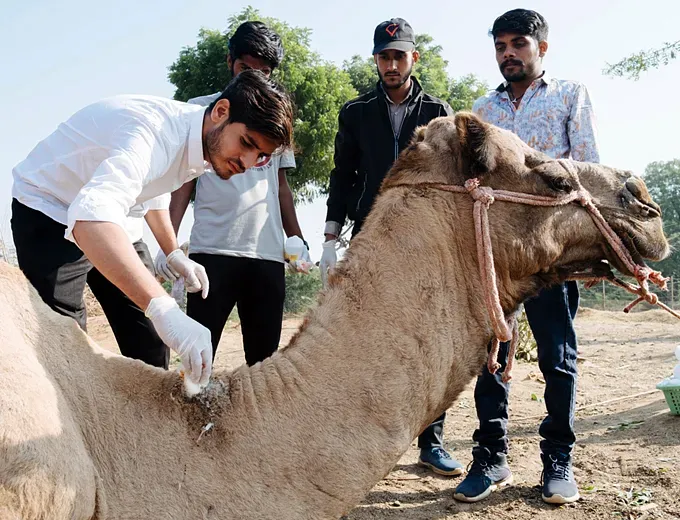How this Sirohi-based NGO is saving camels in Rajasthan from getting slaughtered
People For Animals (PFA), Sirohi has been working on building a shelter home for camels found injured on the streets and those saved from being sent to the slaughterhouses.
What’s the first thing that comes to your mind when you think about Rajasthan? With more than 60 percent of its area covered by the Thar desert, the state is known for its camel population.
Camels are native to Rajasthan and are unsuitable for the climatic conditions of other states as their diet consists primarily of shrubs and plants found in and around Rajasthan.
However, recent data published by the state government showed that the camel population has witnessed a sharp decline of 34 percent. From 3.5 lakh in 2015, the number of camels across the state stood at 2.13 lakh in 2019.

One of the main reasons behind the decline is the illegal slaughtering of camels as well as the lack of proper transportation facilities to villages.
For the past 20 years, the non-profit organisation has been working in Sirohi – 400 kilometres away from the state’s capital, Jaipur – to build a first-of-its-kind camel rescue shelter home in India for camels injured on the streets, and those saved from being sent to the slaughterhouses.
Rescuing and rehoming
Several camels, like many other animals, get smuggled and slaughtered inhumanely and unlawfully. Illegal entry and slaughter of camels violate Section 429 of the Indian Penal Code and other laws.
About 544 camels from different areas of Rajasthan that were being transported to Delhi and Hyderabad were saved by the NGO from being slaughtered.
“After the rescue, we found that 90 percent of the camels were sick. They were dehydrated and starved with their ribs showing, and their hooves were damaged due to the long walk of over 800 miles. They were not given enough food or water during the journey,” Amit Deol, Secretary, PFA, Sirohi tells SocialStory.
“All of the camels were severely injured as a result of resting their massive bodies on hard surfaces rather than the soft sand that they are accustomed to. The unattended wounds had become septic, with maggots eating away at their living tissues. There were also pregnant camels, calves, and lactating ones,” he adds.

PFA, Sirohi team treating a injured camel
Currently, PFA provides regular vaccination against major camel diseases as well as care for injured and abandoned camels. Veterinary services are scarce in the rural areas surrounding Sirohi. Accidents and nose peg wounds are among the major challenges that the PFA team faces.
PFA not only treats sick or injured camels, but also educate owners on proper care and install reflectors on camel carts to reduce the risk of nighttime road accidents. In an emergency, the team at Sirohi team attends to injured and sick camels throughout the city. During routine visits, it treats over 200 camels and may attend to 15-20 emergency cases per month.
Impacting lives
“Industries and people don't consider camels as important animals; they are ill-treated and abandoned, or sent to slaughterhouses for their meat. At PFA, we take care of 400+ such camels today. We also run a vaccination drive every year to vaccinate more than 2,000 camels every year,” says Amit
To date, PFA claims to have organised 204 camps in 204 villages of the Sirohi district. In these camps, it has treated over 17,000 animals, conducted 898 surgical procedures, and performed 4,571 cases of fertility treatments and vaccinations. The total number of animals and owners benefited are 3,84,812 and 12,900 respectively.
PFA works in the Sirohi district, with veterinary medical camp activities functional in the entire district of around 630 villages.
“For achieving our goals of saving homeless camels, we require a helping hand from the public. We are organising a few awareness campaigns – these are small groups of school children, college students, and any others who are compassionate towards animals,” says Amit.
PFA takes financial help from local donors and other PFA centres along with donations from crowdfunding platforms.
With the help and support of Donatekart’s platform, the NGO has raised more than Rs 12 lakh to provide construction kits, fodder, and cattle feed.
Anil Kumar Reddy, CEO and Co-founder of says,
“At Donatekart, We have a large donor community who especially likes to donate towards animal causes. When we saw Amitji’s passion for abandoned camels, we decided to launch a campaign on Donatekart. Our donors have contributed very generously to this campaign and within a month, over 1,200 people donated Rs 15 lakh worth of products. We hope Amitji’s story will inspire many more people to come forward and help abandoned animals in whatever way they can.”
Edited by Kanishk Singh








